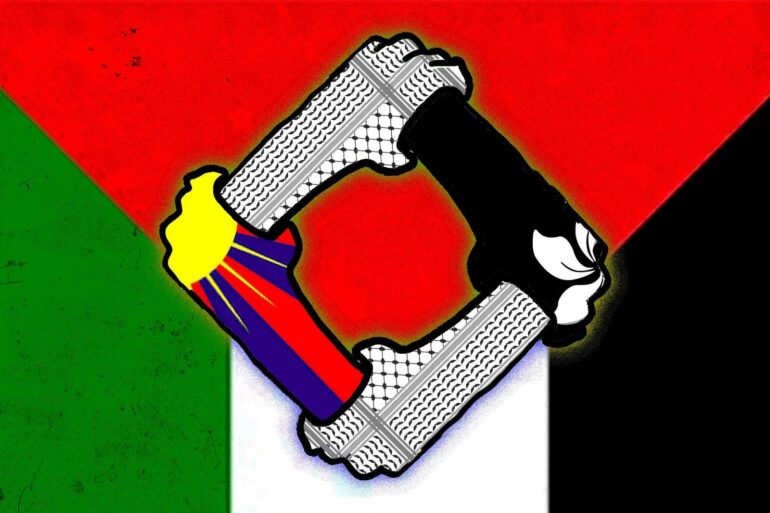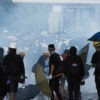Read the Chinese version here.
As overseas Hongkongers and Tibetans based in the US, UK, and Canada, we wholly condemn the Israeli apartheid state’s settler-colonial occupation of Palestine and support Palestinian liberation. We call on the US, UK, and Canadian governments to withdraw military support to Israel, demand Israel to cease its attacks on Gaza, and end the genocidal siege. We also call on our fellow exiled and diaspora communities to stand in solidarity with Palestinian liberation.
Solidarity does not entail conflating different experiences of oppression and suffering. However, we hope to point out that colonizers often share the same tools. The People’s Republic of China (PRC)’s elite police academies have sought to “explore the successful experience of Israel’s anti-terror strategies” to apply to East Turkestan. China’s Minority Ethnic Commissioner has suggested the state should draw upon Israeli settler strategies—as well as historic American and Russian expansionism—in its own colonization of Uyghur and Tibetan land. As our oppressors and colonizers borrow tactics from each other, we, as the oppressed and colonized, lend each other our understanding and solidarity. It is in this vein that we urge fellow Hongkongers and Tibetans to understand Palestinian suffering in its own context.
The Palestine-based Birzeit University’s Union of Teachers and Employees have said: “We do not need to speak of our right to resist, for it is not a right, but a way of being and survival for Palestinians” and that “there is no moral equivalence between the colonizer and the colonized.” Despite how mainstream media portrays the events in Gaza, we must be clear that this tragedy is not a conflict between two equal sides, let alone sparked by unprovoked aggression by Palestinians against Israelis. Supported by multiple major superpowers with vast resources, Israel has threatened and displaced Palestinians over the last 75 years. These displacements and the military violence used to enforce it has marked itself in the collective memory of Palestinians as the Nakba, literally catastrophe. Israel has systematically crushed Palestinian civil society and dispossessed them of their land over decades.
This current campaign against Gaza shows the extent of the power Israel holds over Palestinians. Israeli officials have cut off food, fuel, water, and electricity in Gaza after Hamas’ attack. Israel is bombing hospitals, schools, and homes—even using white phosphorus in densely populated areas, which violates international humanitarian laws. As Israeli historian of Holocaust Studies Raz Segal puts it, “Israel’s genocidal assault on Gaza is quite explicit, open, and unashamed.”
Hundreds of thousands of Palestinians have been displaced in Gaza, with hundreds murdered and thousands injured every day. Israel is ethnically cleansing Palestinians, instructing millions to relocate from North to South Gaza in less than a day—then proceeding to bomb the only escape route along with another humanitarian corridor. The UN has decried Israel’s plan as one which will have “devastating humanitarian consequences.” We mourn the elders, wounded, disabled, and all those who are unable to flee to so-called “safer terrain.”
It is crucial to emphasize that our solidarity as Hongkongers and Tibetans comes from understanding this long historical perspective of colonialism and apartheid. Our solidarity includes grief for all victims who have borne the cost of violent settler colonialism, a project that spills blood inside and outside the fence. Israel and its allies have been consistently speaking in the language of genocidal violence towards Palestine, suppressing many attempts at nonviolent responses from Palestine, such as the Boycott, Divestment, Sanctions (BDS) movement. The constant suppression of nonviolent tactics with violence has led to this moment.
Some of our own movements hold to principles of nonviolence, but we recognize other forms of resistance that were crucial in our movements’ histories. We call attention to how liberals’ emphasis on “nonviolence” is often used to delegitimize decolonial struggles. We also highlight the hypocrisy of Western media in their portrayal of different decolonial struggles. As Tibetans—a people who are fetishized as ideal “nonviolent resistors”—we strongly condemn the ways in which the West has deployed the rhetoric of nonviolence to distract from the genocide unfolding in Palestine. In a similar vein, we remember the silence and inaction from the international community during the 2018–2019 March of Return, when Palestinians peacefully marched towards the border and were shot at indiscriminately. 266 Palestinians were killed and over 30,398 wounded, 16,027 of whom were children. We also wish to emphasize the ways in which nonviolent protest has been actively criminalized through anti-BDS Laws, as well as the policing and banning of Palestine Solidarity Protests in France, Germany, and numerous other nation-states.
The PRC has politically and economically supported Israel alongside the US, even as it performatively supports the Palestinian cause. This has made it incredibly difficult to translate the experience of resisting violent regimes to our communities, let alone to those who have never had the experience of being caught between oppressors. Few understand the terrible toll of grappling with such strategic and tactical questions, when an oppressed people have exhausted every possible peaceful option, only to be met with ever more state violence at every turn.
These are questions we have grappled with in our own movements for self-determination. In many such movements, we have asked: what constitutes proportional response to oppression? What is justified violence? Who on the international stage can offer us material rather than symbolic support? Even when some in our movements pursued tactics that some of us disagreed with, we refuse to accept that they delegitimize the entirety of our movements—instead, we struggle through the contradictions and manifest the movements that we want to see.
We call on those in our communities to be in solidarity with Palestine—to reject a shallow perfunctory politics that does not uphold nor affirm the humanity of the Palestinian people, and to embrace truly liberatory politics that recognizes the shared fates and humanity of all fighting against oppression. From this essential solidarity, we call on those in our communities to bring our knowledge of Chinese collaboration with Israel, such as Chinese investments, technology, and trade support. We encourage our communities to use this information to support the Boycott, Divestment, Sanctions (BDS) campaign and identify more ways to interrupt the supply chains that support Israeli apartheid. Words are free. Actions are felt.
From the river to the sea!
“We know too well that our freedom is incomplete without the freedom of the Palestinians; without the resolution of conflicts in East Timor, the Sudan and other parts of the world.” —Nelson Mandela, Address by President Nelson Mandela at International Day of Solidarity with Palestinian People, Pretoria, 4 December 1997.
Resources:
Palestinian Solidarity Campaign Emergency Response 2023
Gaza Urgent Relief
Canadian action list:
Gaza on the Brink: Ceasefire now!
Globe and Mail editorial must be rescinded – The Media Accountability Project
US action list:
Jewish Voice For Peace Dialer to Congress
US Campaign for Palestinians’ Rights
UK action list:
Email Your MP by Medical Aid for Palestinians
Email Your MP by Islamic Relief UK
#EducateYourMP by Friends of Al-Aqsa
Additional resources:
Basic Reading List by Palestinian Youth Movement
Countering Anti-Palestinian Messaging Toolkit
The Hamas Attacks and Israeli Response: An Explainer
Talking About Apartheid: IJV Factsheet
On Mourning and Statehood | Dissent | Gabriel Winant
A Hole in the Limits of the World | Online Only | n+1 | Ismail Ibrahim
“We Cannot Cross Until We Carry Each Other”
Canada and Israel: Partners in the “Settler Colonial Contract”, by Azeezah Kanji
Decolonize Palestine




